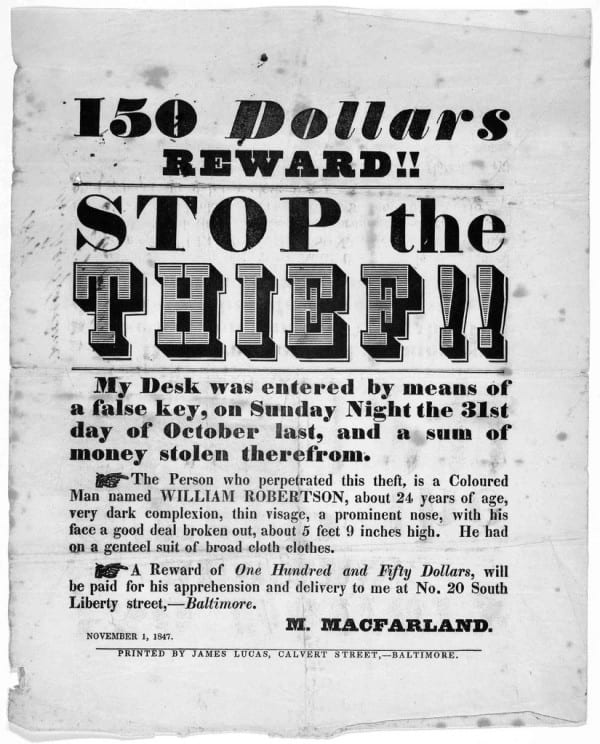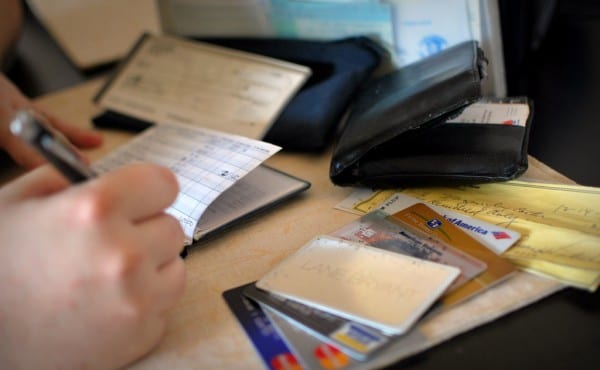Are you worried about the economy tumbling into oblivion? Scared that some stranger will break into your home? Paranoid about losing your youthful good looks?
Don’t worry. You can buy your peace of mind. Whether it’s a pill, a locking system, or legislation, someone has the perfect solution. Just make sure you pay up to get it.
Indeed, even if the most crucial professionals, like doctors, have their own ways of scaring you into agreeing to their offerings. We look at how 25 everyday people and industries take a bite out of you by playing on your fear.
(Note: I read a lot of sociologist Frank Furedi’s material before writing this post. I was especially influenced by his ideas on religion, wellness, experts, advocacy, and the environment. I want to encourage readers to read more of Furedi’s work, as he’s a true expert on society and fear.)
25. The Security Industry

Image: Roland/Flickr
Security is, by definition, the opposite of fear. It stands to reason that the security industry, which sells products and services that protect your body and assets, makes big bucks of off fear.
The funny thing about security is that not all of it works. How many times have you ignored a car alarm, waiting for the owner to finally turn it off? Or what about home security companies, which profit from installing systems that may make you feel better, but that essentially rely on the taxpayer-funded police for action?
The security industry knows that the more paranoid you feel, the more likely you are to put your hard-earned money towards their products. Let’s just say their interest is not in making you feel better about the world. It just doesn’t sell.
24. The Beauty Industry

Image: sushinecity/Flickr
If a product has the prefix “anti” in front of it, it’s probably fighting a very undesirable condition. Some of these “anti” products, like antifreeze, are quite useful.
Leave it to the beauty industry, however, to create an entire class of products that fight humanity’s most natural process: aging. Anti-aging creams, balms, and sprays will set you back financially, but will they really stop you looking like you’re aging?
Indeed, the beauty industry has a knack for promising a cure for the appearance flaws that petrify some women. From antiwrinkle pillows to anti-cellulite cream, beauty companies would have you believe that the solution to growing older lies in ill-proven products.
What they don’t want to tell you is this. If you really want smoother skin, you’ll have to stay out of the sun and save your money for your plastic surgeon.
23. The Pet Care Industry

Image: wsilver/Flickr
Dogs and cats have been human companions for centuries. Despite the fact that yesterday’s pets lived happily on farms, our 21st-century darlings come with microchips, hypoallergenic organic sleeping pads, smoked BBQ chicken treats, and full insurance.
What would happen if you took all those things away? Most pets would be fine. Yet fear of the unpredictable keeps us buying extras in the name of pet safety and well-being. As long as you believe that Snowball would be traumatized without that lavender aromatherapy shampoo, you’re playing into the system, too.
22. The Anti-Germ Industry

Image: B Rosen/Flickr
A host of companies make the antibacterial soap, antimicrobial pillows, antifungal shoe inserts, and many other products that promise you instant sanitation. Because there’s no formal name for the cottage industry that has emerged around the antibacterial title, we’re going to call it the anti-germ industry.
Recent history has proven that if you sell products that kill germs, you make a killing. Consumers’ paranoia about dirt and germs is so aggravated that things like antibacterial chopsticks actually sell.
Over the years, researchers have discovered that our love of antibacterial products has had negative repercussions like antibiotic-resistant superbugs and an increase in allergies. Expect the PR machine to backlash with a new set of probiotic products, containing human-approved bacteria, in the near future.
Buy more gold.
Sell now.
Inflation is coming.
It’s a deflationary cycle.
Browse financial experts’ websites for five minutes, and you’ll probably walk away with a headache. Most of these folks are very smart, very concerned about your money, and very sure that they’re right.
Act now, and for a low monthly fee, you’ll get their premium newsletter, Platinum-level picks, and market prognoses. Don’t wait until you lose all your money in the stock market!
20. The Weight Loss Industry

Image: klf_bdf/Flickr
In the US, we associate attractiveness with lean, fit bodies. If you’re carrying around a few extra pounds, though, that doesn’t mean you’re unattractive. But the weight loss industry would like you to think you are.
If you read into their invisible fear memo, carrying around extra weight will keep you from finding a partner. It will diminish your social status or even outcast you. Nobody will care about you. You simply must combat those extra pounds through diet pills, fad diets, or any of the other myriad offerings of the $50 billion weight loss industry.
The industry’s promise of instant self-esteem will assuage your fears of being an eternal bachelor or perpetual fat girl. You, too, can lose weight for just $99.95 + tax. Come on, sign up now!
19. Banks

Image: The Consumerist/Flickr
What if your credit card gets stolen? What if you lose your job and can’t pay your mortgage? How about if someone steals your ID? Banks offer products to protect you against those worrisome possibilities, however remote they actually are.
In many cases, however, you should be more worried about the bank taking your money than losing it in a more organic fashion. JP Morgan Chase, for example, slips in an extra $2 non-Chase ATM fee every time you pull money out of a non-Chase machine. That’s in addition to whatever the machine charges you. Bank of America snags a $400 processing fee from your credit card before you’ve signed any refinance papers with them, making an instant buck and locking you in without actually promising you anything.
Banks, especially in the US, profit by quietly bilking you. But if you buy their insurance products, you’ll be safe, they pinky-swear that.
18. Consultants

Image: foundphotoslj/Flickr
Even if you went to school to obtain at minimum a Bachelor’s degree, and more than likely have an MBA, your business still may be doomed for failure. Unless you hire a consultant.
It doesn’t matter if your degree is directly related to your multi-million dollar corporation, or if you have years of experience. A consultant who has no knowledge whatsoever about your chosen field holds the key to your success. Follow his or her advice, and your company will be just fine.
Don’t hesitate to hire business help. If you falter in any way on your own, after all, your business will crash and burn like the Hindenburg.
17. Doctors

Image: lanchongzi/Flickr
Without doctors, we’d be screwed. But, thanks to a convoluted for-profit healthcare system, some doctors are now screwing us, too. At some point during their training, these doctors learn that making you better involves potentially unnecessary tests and procedures. Like operating on a patient the first time she sees you for gallstone pain, as mentioned in this excellent New Yorker article. Or running a lucrative private surgery center on the side.
Some doctors–I dare not implicate the profession here–“figure out ways to increase their high-margin work and decrease their low-margin work,” according to the New Yorker. In other words, they act like businesspeople. And it certainly helps when you’re scared enough to trust that every referral, procedure, and medication they give you is, in fact, necessary to make you better.
16. The Children’s Products Industry

Image: Striatic/Flickr
If there’s one demographic we want to keep safe, it’s our babies and children. But we’ve moved beyond that, into what Reader’s Digest writer Lenore Skenazy calls the “Kiddie-Safety Industrial Complex.”
Manufacturers want you to protect your precious bundle with baby kneepads, toddler helmets, and a host of other paranoia-friendly accouterments (see Skenazy’s fantastic article for the full lowdown). While a number of kids’ products are indeed dangerous, advertisers will still play on your most neurotic tendencies to squeeze out those extra consumer dollars.
15. The Environmental Industry

Image: [MP]/Flickr
Did you accidentally spill gasoline as you were filling up? Did you miss the garbage can and unwittingly litter? Thanks for killing the planet, you petroleum-leaking litterbug.
Remember what Paul Ehrlich said: “In ten years all important animal life in the sea will be extinct. Large areas of coastline will have to be evacuated because of the stench of dead fish.” Ehrlich said these words in 1970, but the sense of guilt and dread in the environmental movement remains the same.
Fact is, we do have a lot of environmental problems. They’re impossible to ignore. But there have been improvements, too. Unfortunately, highlighting those doesn’t scare you into supporting any causes. When it comes to the environment, fear just seems to be the proven formula.
Bonus: Capitalism has caught up with environmentalism. You can now buy a host of “green” products that you may or may not need–and that may or may not help the environment, depending on who’s peddling them.
14. The Self-Help Industry

Image: Desmond Kavanagh/Flickr
Life Coaches, spiritual guides, organizers, oh my! When did we make the shift from managing our own lives to seeking an expert for everything? From creating a home-office filing system to understanding why can’t seem to progress on our jobs to tapping into our inner psyches to figure out we don’t along with our neighbors, there’s an expert for that.
What’s wrong with accepting that you’re not the most organized person? Or that you need to get another degree to move ahead at work, or that your neighbor is nuts?
Somewhere along the line, all our defects were pathologized. And help, my friends, is only a few dollars away, in the form of an expert or book. Just remember–there’s always something else that you can outsource a cure for.
13. Advocacy groups

Image: LaurenV/Flickr
Society’s treatment of children and animals may well be on the upswing, but many advocates would have you believe that it’s all Sturm und Drang, all the time. The idea is to scare you into thinking that their target topic is horribly affecting your life–then giving them money to fix it.
Sociologist Frank Furedi calls these kinds of people “secular moral entrepreneurs.” Here’s how Furedi says they work:
…advocacy groups use ‘surveys’ and ‘research’, rather than the language of good and evil, to claim that a particular problem is getting worse and that, unless Something Is Done, it will engulf the whole of society.
Secular moral entrepreneurs continually seek out new opportunities to promote their cause, in a process described by sociologists as ‘domain expansion’: that is, expanding a widely recognised problem to encompass new issues. For example, widespread public concern about child abuse has encouraged secular moral entrepreneurs to use the language of abuse in relation to other issues, too: some now campaign to prevent ‘elder abuse’, ‘animal abuse’ and what they call ‘peer-to-peer abuse’.
It is now even argued that people who are cruel to animals are likely to be cruel to their family members as well – in other words, one form of abuse begets another. With relentless repetition, and the support of the media, this imaginative linking together of disparate problems can become a kind of conventional wisdom.
So when you hear stats like “one in four US teen girls reported that they met strangers off the Internet,” remember that all those people weren’t sexual predators–but someone would like you to think so.
12. The IT industry

Image: phil_g/Flickr
You’ll do anything to avoid getting a computer virus, won’t you? Thanks to a few bad ones, we’re convinced that horrible things will happen to our computers. Ignorance about all things technical helps fuel the mass hysteria.
Don’t believe it? Have you ever forwarded emails from friends and family about the latest virus that’s going around, regardless whether you’ve verified it on SNOPES? Did you ever bump up your weekly anti-virus download so as not to take any chances? Did you buy all the proposed fixes and still stay up all night in December 1999 anticipating Y2K? Yep, they got you!
11. Fraudsters

Image: Mon1ca/Flickr
Fear impairs your capability to logically assess a situation. Fraudsters know that. That’s why they’re so good at siphoning off money, especially from more vulnerable populations, like seniors.
If you’ve ever fallen for a phishing scam (“Your account has been compromised! Please enter your login and credit card information here so that we can reactivate it!”) or a job that makes you pay upfront for training or materials you never get, then you know what I’m talking about.
The more they make you panic, the more likely you are to cough up your dough. And they succeed, year after year.
10. The Pharmaceutical Industry

Image: JasonTromm/Flickr
Drug companies profit from treating diseases, not curing them. So the more conditions there are to treat, the more drugs a drugmaker can sell. No wonder they spend way more on marketing than on R&D.
By branding and marketing their drugs, then finding new uses for them and rebranding, drugmakers squeeze out as much profit out of a formula as they can. That’s how Prozac became Serafem, a drug marketed for PMS—I mean PMDD. The more conditions a drug company can medicalize, the more potential it has for rebranding its formula.
According to Naked Capitalism’s Yves Smith:
Something like 88% of the so-called “new drug applications” in the US are for alternate uses of existing drugs (so the salesforce can market it legally, doctors are free to prescribe for other uses) OR improved formulations of existing drugs (no joke, stuff like a time released version of Wellbutrin so you only need take it 1X a day). The “improved formulations” type were invariably priced well out of line with the added benefits.
Needless to say, Big Pharma isn’t interested in curing you. It’s interested in keeping you sick—and swallowing its pills.
9. Collections Agencies

Image: meddygarnet/Flickr
If you have ever gone delinquent on paying a credit card or three, you’ve likely received a letter from a collection agency. Their letters, if left ignored, get increasingly irate suggesting everything from “we can settle this with one phone call” to threatening lawsuits. Fearing the latter, you either pay or make arrangements to pay.
Assuming that you’ve accepted that your FICO is going to be seriously compromised, it’s important to know what collection agencies can and can’t do to you. They cannot take you to court and if you write them to tell them to “lay off” they have to, by law. They prey on your fear, ignorance and guilt to get their money. Know your rights!
8. Niche Experts

Image: jurvetson/Flickr
In spite of all the information available to us on the Internet, we seem to have returned to the Dark Ages in terms of relying on some expert to educate us. Whether it’s the severity of the latest flu, the Gulf Oil Spill’s impact on the environment, or even the social ramifications of a child raised by a homosexual couple, anyone with an opinion today is easily deemed an expert.
Anyone can use phrases like “research shows” without a shred of evidence to back up their claims. Granted, some of these so-called experts are actually leaders in their fields, but that’s usually impossible to know upfront. As long as any “expert” has your attention, their game is working.
7. The Wellness Industry

Image: House of Sims/Flickr
The wellness industry focuses on preventing illness instead of fighting it once it has appeared. The industry, which covers everything from massage to supplements to gym classes, plays an important role in keeping everyone fit and well-nourished. But that doesn’t stop the industry from trying scare you into buying their goodies. Sociologist Frank Furedi describes it best:
They preach the message that people’s lives are becoming more and more unhealthy, and thus we need to be ever more vigilant in order to avoid becoming diseased…The premise is that being well is not a natural or normal state – instead it is something people need to work on, something to aspire to and achieve with the help of experts and gurus. Health activists insist that, unless you follow their prescribed patterns of behaviour, your risk of becoming ill will increase.
Once you’re convinced that you need to replace your toxic canola oil with extra-virgin olive oil, you subject yourself to even more potential trickery. But as long as you feel safe and healthy, everything’s okay, right?
6. Prisons

Image: ahisgett/Flickr
We all want our streets to be safe from thugs, miscreants, druggies, and the rest of society’s maladapted. Yet it’s hard to believe that the nearly 2.3 million people in our jails in mid-2009—roughly a quarter of the world’s prisoners—are all there for good reason.
One in 100 adult Americans is locked up, according to the New York Times. The more afraid you are of criminals, the more likely you are to support political measures that keep this mind-blowing incarceration rate alive. As a result, we jail people for more crimes and longer terms than most other countries, writes the New York Times.
Who profits most from this? Politicians taking a “tough on crime” stance, the companies running private prisons, and the businesses supplying government prisons with goods. A full prison, after all, is a profitable prison.
5. The Gun Industry

Image: Gideon Tsang/Flickr
The recession shows no signs of weakening. People are foreclosing on their homes at a staggering rate. Yet gun sales are through the roof.
Gun sales and fear run on parallel barometers. Shocking footage from Columbine or Virginia Tech seems to make people more likely to stock up on steel protection than ask questions about causes.
Alarmist messages like “(we’re on a) slippery slope toward more Draconian gun restrictions and, ultimately, toward confiscation of all guns” only add fuel to the fire. There’s that fear relationship again: Fearing tougher gun restrictions in the future makes stacking up on semi-automatic weapons seem like the only answer.
4. Insurance companies

Image: OpenSkyMedia/Flickr
Rental car collision insurance. Flight insurance. Contact lens insurance. Death insurance, life insurance, dismemberment insurance, disability insurance, accident insurance…you could insure yourself up the wazoo, if you so desired. But how many of these so-called safety contracts do you really need? If you’re scared of everything, well, you need them all. And you’ll fatten a few bottom lines in the process.
3. Religion

Image: giopuo/Flickr
Religion is a fairly new concept to humans, given how long we’ve been on earth. Yet for two thousand years, religion has been upheld as the ultimate solution to reign in the sinners and strays among us.
Using it to condemn anyone who is not living a “morally fit” existence is quite the norm. From eating pork and drinking (preferably simultaneously) to swearing and “living in sin,” when it comes to religion, people check their own moral compasses at the door. Instead, they choose to listen to those who promise them hell if they continue these sinful acts.
How to redeem yourself? Oh right, tithing and sworn loyalty, plus the occasional potluck.
2. The Media

Image: ShironekoEuro/Flickr
The media mainlines fear for profit. On any given day, the newspapers, websites, and TV shows that make up the MSM (mainstream media) will tell you about baby killers, deadly wild animals, conspiracies, crashes, fires, and terrorists.
Here are some examples of real-life media headlines I found one random afternoon while browsing the Web:
Baby, toddler kidnapped at gunpoint
Coroner: Wild dogs killed Ga. woman, then husband
America’s Soul is Lost and Collapse is Inevitable
Once the media ratchets up your anxiety with scary stories, you’ll keep turning to it for answers, or at least updates. Meanwhile, the media profits off the advertisers, impressions, ratings, pageviews, and all that other soft currency that results from your sustained attention.
Terrorists. Death panels. Peak oil. Can you read those words without feeling a twinge of fear in your gut? No?
Good. That’s just how politicians want you to feel. When they have you scared, they stand a better chance of passing legislation in line with their own interests. George W. Bush handily used our fear of terrorism to swiftly invade Iraq, despite little premise. Obama is trying to assuage our fear of economic failure by talking of the promise of cap and trade and green jobs, things that are minor in execution. Then there’s that Arizona immigration law.
The more fearful you are, the more likely you are to support laws that you think will soothe that fear. And the merrier politicians get.


